
Galing Pook Contents 03 04 05 06 08 10 12 14 16 18 20 22 24 26 27 28 30 31 The Galing Pook Stories of Inspiration and Hope in Local Governance Spurring Progress in the Countryside Together, Making Lives Better PALMA Alliance Eco Savers Marikina City Preparing Future Leaders Naga City The Village Mediators Cebu City Land and Shelter for the Homeless Las Piñas City Price Support for Rice and Corn Farmers Isabela Health Insurance for the Poor Bindoy, Oriental Negros A Community Prepared for Disasters Infanta, Quezon Munggo: The Black Gold of San Mateo San Mateo, Isabela Water Levy for Watershed Development San Carlos City The 2007 Finalists Special Citation on Local Fiscal Management 2007 National Selection Committee The Galing Pook Board of Trustees and Secretariat Galing Pook Theme Song Cover Design by Allen M. Mariano • Text and Layout by Allen M. Mariano • Photos by Jimmy A. Domingo and Alex Baluyut 2 • Galing Pook 2007
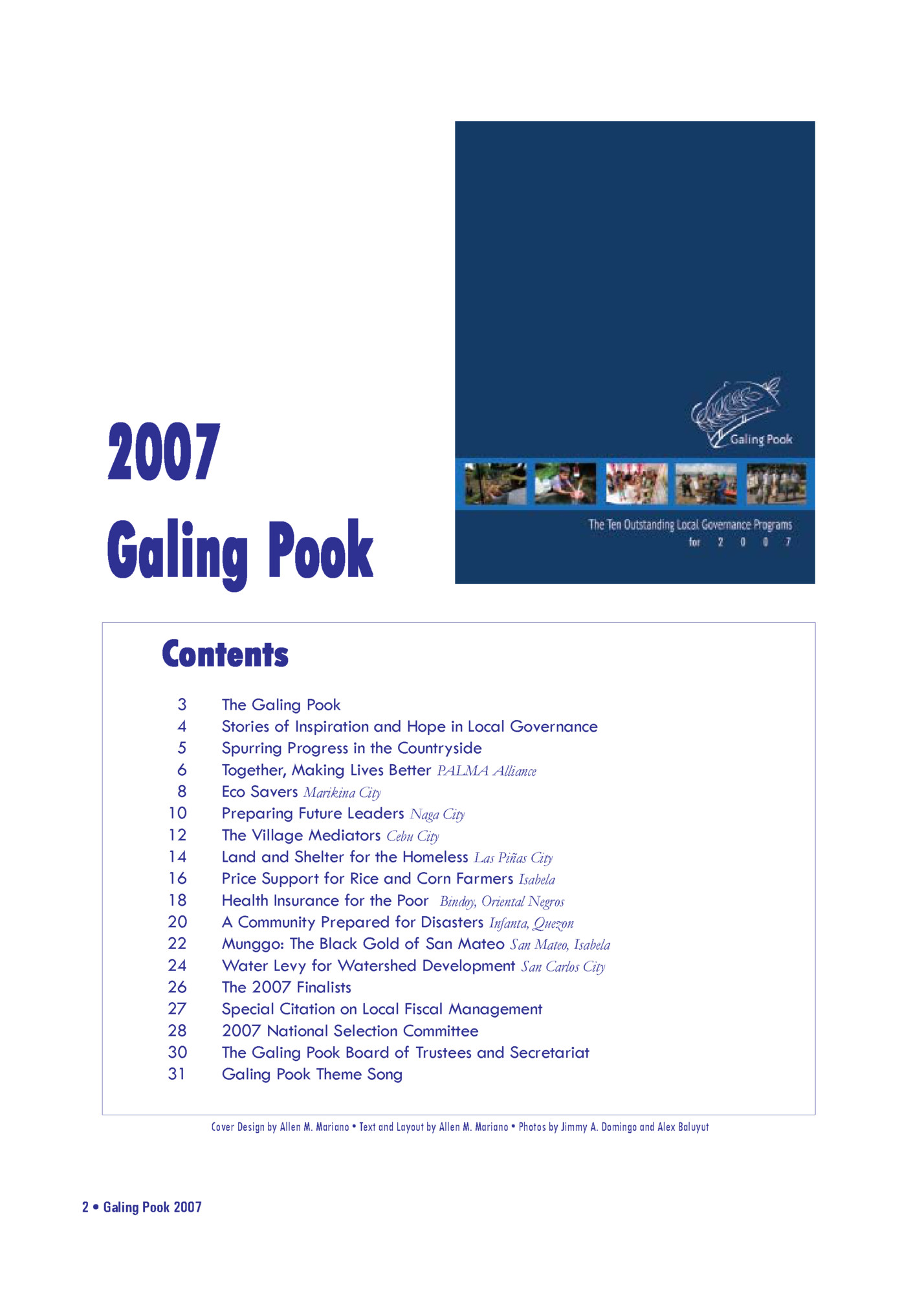
The Galing Pook Vision We are a leading resource institution that promotes innovation, sustainability, citizen empowerment, and excellence in local governance. Mission We promote excellence in local governance through recognition, sharing of information and support of efforts to replicate best practices at the local level. We encourage partnerships among civil society organizations, private sector, and government agencies at local, national and global levels to improve quality of life. Par artners The Partners FORD FOUNDATION LOCAL GOVERNMENT ACADEMY T he Galing Pook awards is a pioneering program that recognizes innovation and excellence in local governance. It started in October 21, 1993 under the joint initiative of the Local Government Academy-Department of the Interior and Local Government, the Ford Foundation, and other individual advocates of good governance from the academe, civil society and the government. The Asian Institute of Management carried on the awards program until 2001. Earlier in 1998, the Galing Pook Foundation was formed as a juridical institution to sustain the program. Since 1994, more than 200 programs from 136 local government units have already won recognition. The Galing Pook winners are chosen each year from a wide array of programs from local governments after undergoing a rigorous multi-level screening process. The winning programs are selected based on positive results, promotion of people's participation and empowerment, transferability and sustainability, and efficiency of program service delivery. Galing Pook 2007 • 3
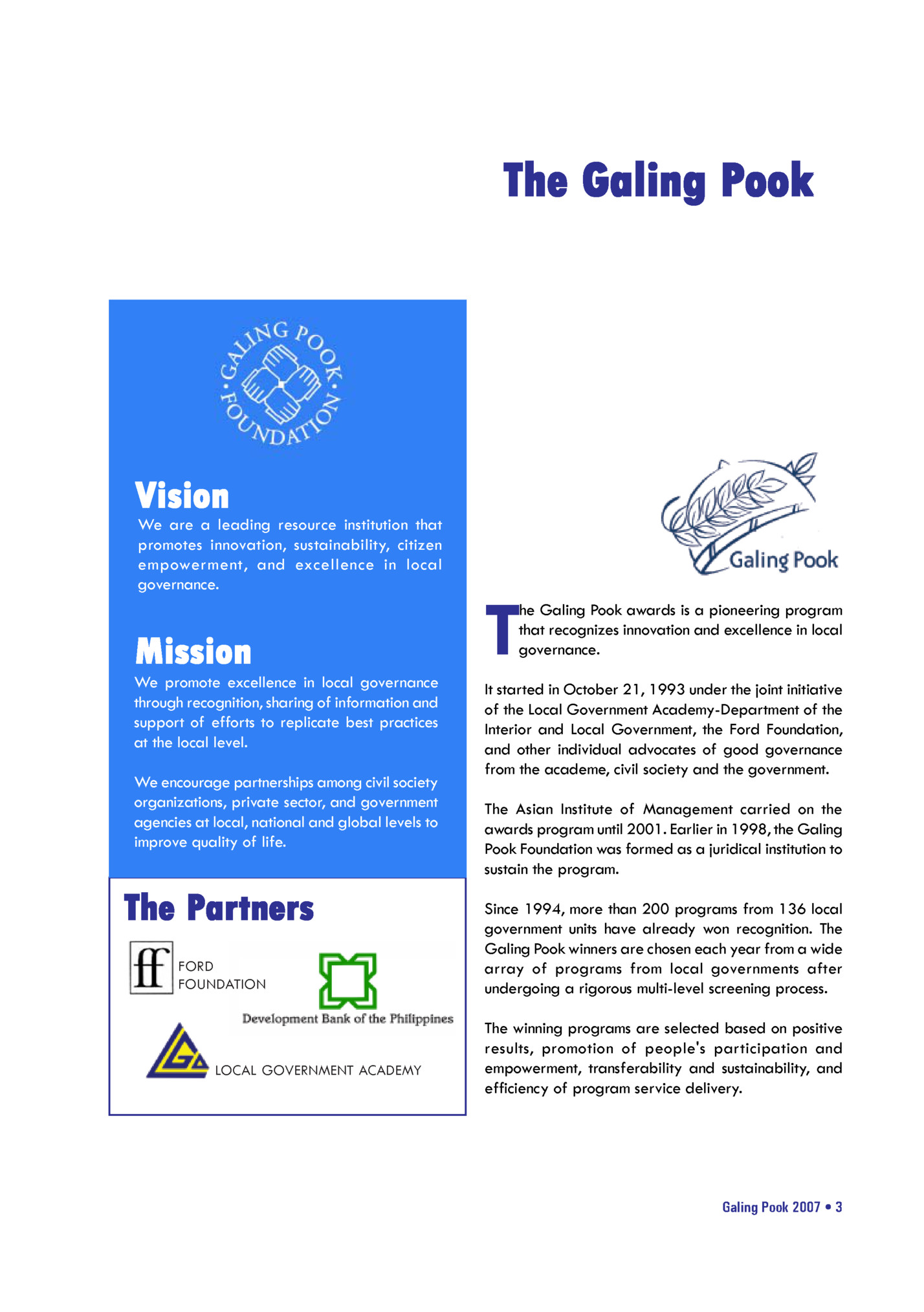
in Local Governance Gov RAFAEL L. COSCOLLUELA Chairperson Galing Pook Foundation W hen bad governance hits the headlines almost daily, ordinary citizens feel nothing goes well anymore. Indeed, good governance in the public sector has become a major gut issue today. Happily enough, we continue to find local governments that provide stories of hope and inspiration and show that good governance exists and thrives throughout the country. Our latest harvest of Galing Pook awardees illustrates better ways to make local government work— how to create responsive public institutions, deliver new services in new ways or simply strengthen citizen’s participation in governance. The places where these success stories happen are “galing pook” (great places). Their stories showcase inspiring achievements of local communities, where local government units partner with the people for local development. They prove that decentralization works, even with limited resources and in spite of traditional politics. These local governments involve their stakeholders, especially the poor, in finding and implementing creative solutions to old problems. They transform people, structures, systems and procedures to effectively deliver basic social services. They find support outside their communities to sustain and expand their work. Their stories demonstrate that transparency, accountability, professional management and responsive service delivery are the best way to win the people’s trust and secure their active participation. This year’s awardees provide an exciting array of experiences in youth development, watershed conservation, disaster management, infrastructure and livelihood development, health insurance for indigents and agricultural development. They showcase innovative LGU efforts to build houses for the homeless, to preserve watershed areas through an innovative financing scheme, and to pool limited resources through intraLGU partnership to build their own roads in Mindanao. They highlight the boundless creativity of local governments, whether it be in addressing natural disasters or preparing the youth for governance. These success stories inject positive notes into our national consciousness, but the successes have yet to reach a scale sufficient to lift the entire nation up the ladder of sustained progress. Galing Pook, by recognizing these achievements, seeks to spread the word and have these best practices replicated by LGUs and their communities everywhere. Ultimately, it is hoped that when citizens experience good governance at the local level, they will expect and demand—no less from ALL of government, at ALL levels. Mabuhay! We found a wealth of best practices and initiatives that show better ways to make local government work — how to create responsive public institutions, to deliver services to the people and to encourage citizen’s participation in governance. We call these success stories, “galing pook” (great places) 4 • Galing Pook 2007

Countryside Spurring Progress in the Countryside REYNALDO G. DAVID President & CEO Development Bank of the Philippines I t is a privilege for the Development Bank of the Philippines to be a partner of the Galing Pook Awards 2007 Program. As the country’s premier development financial institution, DBP takes pride in supporting and promoting sustainable initiatives that result in positive socio-economic developments, something that this year’s Galing Pook awardees have clearly demonstrated. Like our awardees, DBP is committed to spurring progress in the countryside to benefit the better part of the population. Our partnership with local government units, in particular, has enabled the Bank to bring the benefits of development to our countrymen living in far-flung areas. Through the years DBP has worked closely with LGUs for the provision of basic services such as water systems, infrastructure facilities, housing projects, and other similar programs that address the fundamental needs of a progressing society. DBP is guided by the same priorities that have shaped its progress in the past. Today, it is performing its developmental imperatives on a deeper and more meaningful scale by partnering with relevant groups that can support the bank’s initiatives and values in spurring growth in the countryside. The focus is on proper and expeditious execution. Galing Pook is precisely one of those groups that we believe is a critical partner in turning our values into actions everyday in countless ways. DBP’s lending portfolio for local government units gives a good impression on how much work the Bank has done in partnership with local government units. As of December 2007, DBP has appropriated close to P13 billion to some 205 LGU clients. We are also currently evaluating an additional P4.3 billion in prospective loans for 24 LGU borrowers, plus P6.4 billion more have been penciled in for 70 prospective LGU projects. We invite LGUs to partner with us so that we can initiate more development programs outside of Metro Manila. Partnering with us could not come at a better time. Indeed, the economic climate has changed for the better. Optimism is running high, with the country posting a record 7.3 per cent growth in its gross domestic product, its best showing in over three decades. The global financial community is looking at our country as one of the more promising economies this side of Asia. We urge you to take advantage of the momentum and join us in effecting positive socio and economic changes for our countrymen. On behalf of DBP, let me congratulate this year’s Galing Pook winners. The recognition you have earned is a testament to your dedication and perseverance in ensuring that you give paramount public service to your constituents. LGUs like yours deserve the respect and emulation of your peers for helping raise the bar of good public governance in this country. You have clearly demonstrated that progressive, results-oriented LGUs are making a difference in their respective localities. More importantly, you are testaments to the fact that best practices in local governance continue to thrive all over the country. Your initiatives are humble yet significant steps towards making our countrymen experience the benefits of development. They are likewise manifestations of your passion and commitment to push the nation forward towards global competitiveness and relevance. DBP shares in this very same vision: that of building a better, more progressive Philippines. Let us all work together so that we can continue to make this country a more comfortable place to live in, especially for future generations. LGUs like yours deserve the respect and emulation of your peers for helping raise the bar of good public governance in this country. You have clearly demonstrated that progressive, results-oriented LGUs are making a difference in their respective localities. Galing Pook 2007 • 5
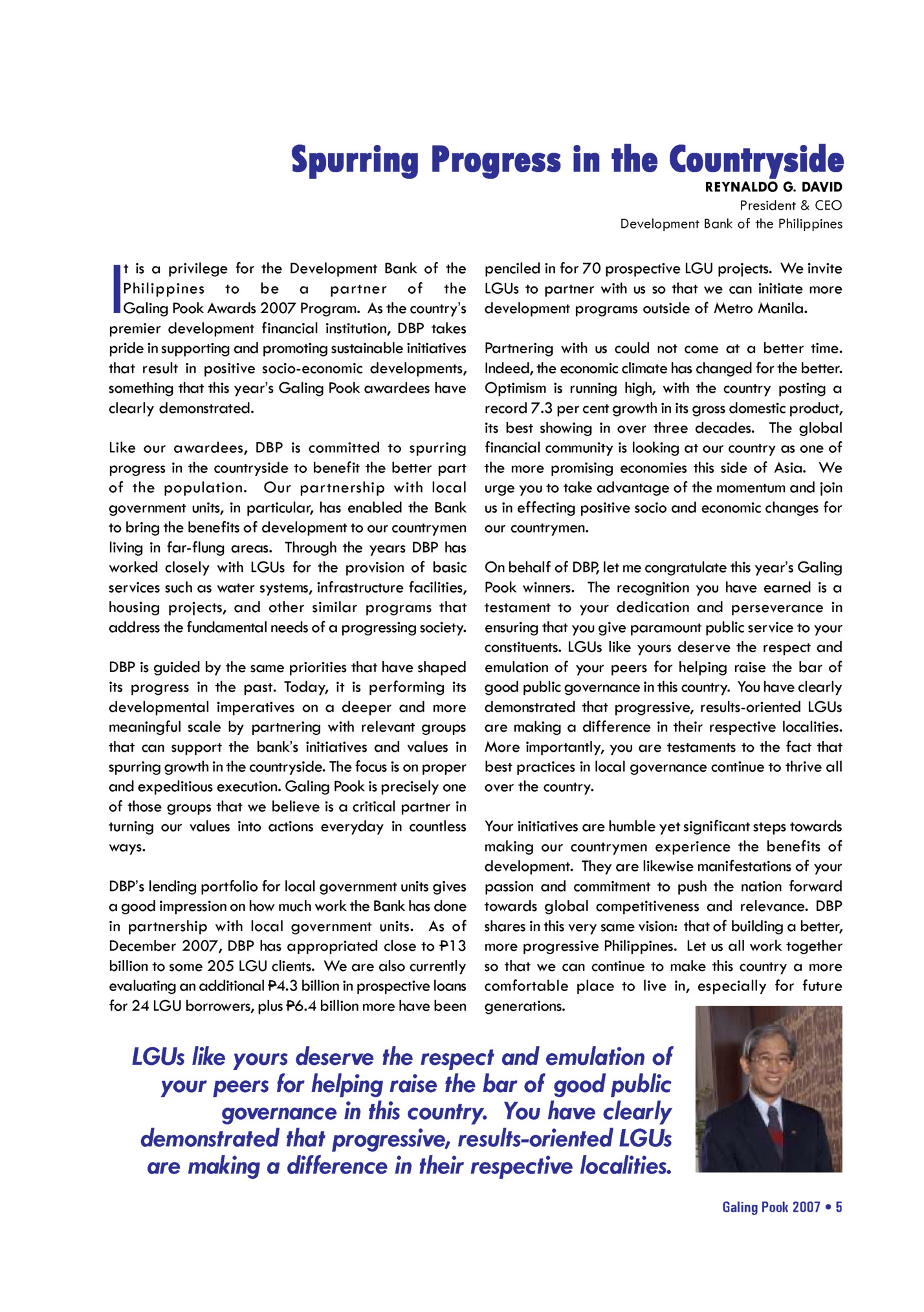
The PALMA Alliance gether, Lives Together, Making Lives Better N ormally, building a kilometer of an allweather road would cost a million pesos—the fee charged by private contractors. This is quite a hefty expense for a municipality to shoulder alone. But in Cotabato, five contiguous municipalities, with the help of the provincial government, pooled their resources and proceeded to build a road network which cost them roughly P30,000 a kilometer. consisting of a bulldozer, a grader, three to four dump trucks and a road compacter. With two fleets at their command, the alliance was able to expedite road rehabilitation and covered more areas in less time. The host municipality or barangay would pay only for the fuel of the equipment and a labor fee of P200 each for the workers. This is translated into sizeable savings for the members of the alliance. In what was dubbed as the Kabalikat PALMA Infrastructure Project, the member LGUs of the PALMA alliance pooled their infrastructure equipments, machinery, personnel and expertise to collectively work on road building projects in the member towns. PALMA is an acronym for the names of the five municipalities: Pigcawayan, Alamada, Libungan, Midsayap, and Aleosan. They managed to form two fleets; each Started in February 20, 2002, the project has rehabilitated and opened new roads totaling 281.45 kilometers of farm-to-market roads, with a total cost of P8.475 million. Pigcawayan registered the highest number of kilometers of roads completed with 91.46 kms. followed by Aleosan with 72.4 kms. Both towns have roads going to upland barangays, which often require rehabilitation and maintenance. 6 • Galing Pook 2007
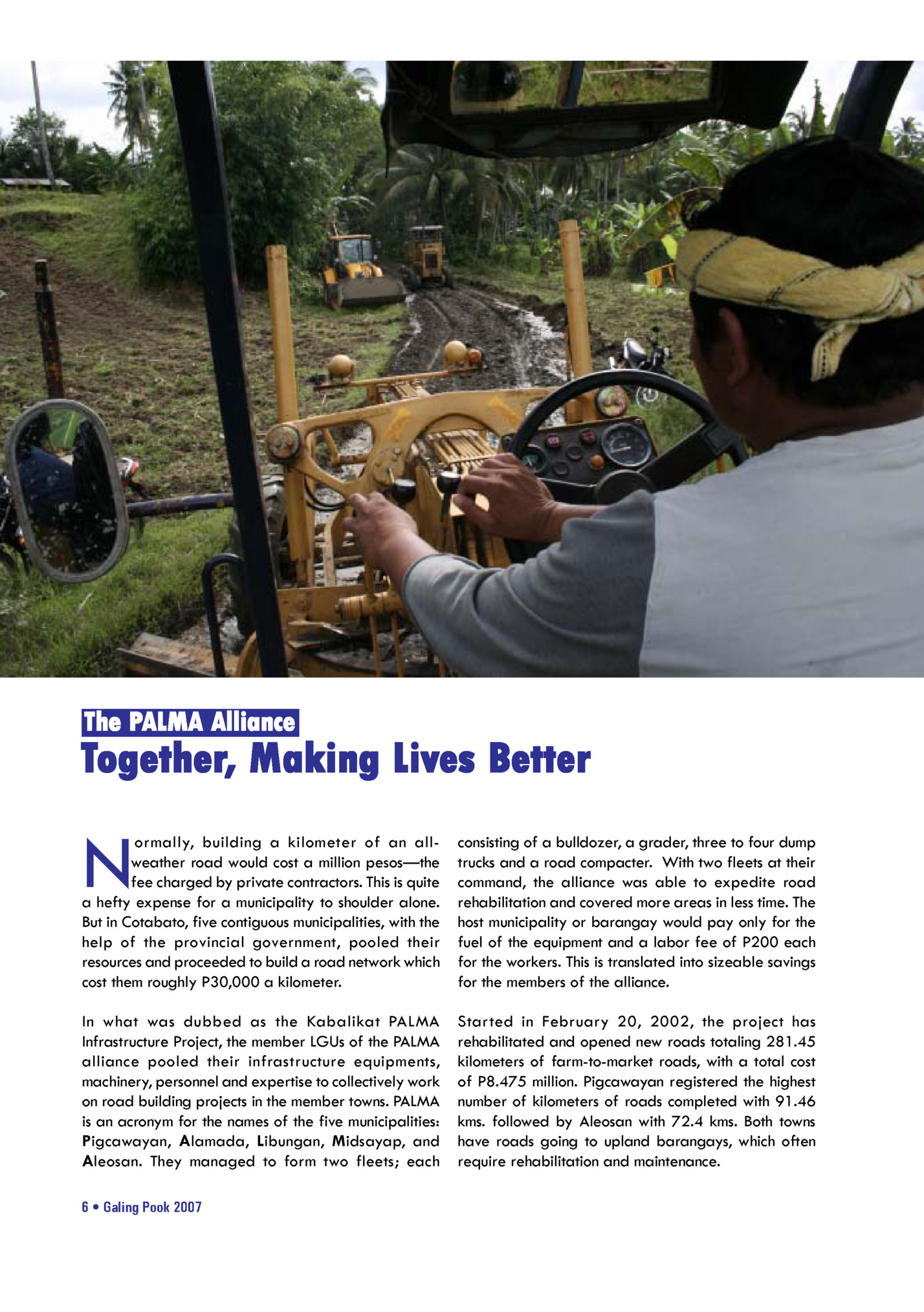
made the lives of the people in around 145 barangays much better. Among the noticeable improvements were a 20% increase in agricultural productivity resulting in more income for the farmers, reduced transportation costs, reduced travel time by as much as 50%, improved access to social services by people residing in far-flung barangays, and more entrepreneurial opportunities for the women. Cooperation and sharing between and among the project stakeholders and beneficiaries were also visibly enhanced. What is noteworthy about the program is that the people have conscious ownership of the initiative as they are involved in planning, implementing, monitoring and sustaining the project. At the barangay level, the community is responsible for providing lodging for the drivers and operators of the heavy equipment, securing and safeguarding the mac hineries, providing snacks and meals for the work force, super vising and monitoring the implementation of the project in their locality and helping in the upkeep and maintenance of roads in their locality. On the other hand, the municipality is tasked with the deployment of its equipment to the host municipality or barangay ensuring that these are serviceable and in good working condition, contributing P 2 0 0 , 0 0 0 annually to the PALMA Alliance’s coffers and monitoring and evaluating the project implementation. To ensure the project’s sustainability, enabling mechanisms have been institutionalized. These include a well defined organizational structure, community participation, information dissemination as well as legislative and budgetary support. With the realization that pooling resources and manpower is an effective way of developing their communities, the PALMA Alliance has also begun using the same strategy to pursue other development initiatives in environmental protection and health. Total number of kilometers of LGU Phase 1 Pigcawayan 25.0 Alamada 12.0 Libungan 6.5 Midsayap 10.0 Aleosan 6.1 TOTAL 59.6 roads completed from 2002-2006. Phase 2 Phase 3 TOTAL 33.2 33.2 91.4 16.8 9.5 38.3 21.0 0 27.5 0 41.8 51.8 22.8 43.5 72.4 93.8 128.0 CONTACT And it looks like these five municipalities have taken the right road to better, faster and cooperative local governance. Governor Jesus N. Sacdalan (Cotabato) Mayor Herminio S. Roquero (Pigcawayan) Mayor Ernesto Margate Concepcion (Alamada) Mayor Manuel T. dela Serna (Libungan) Mayor Manuel M. Rabara, DDM (Midsayap) Mayor Loreto V. Cabaya, Jr. (Aleosan) Tel. Nos. (064)229-7648; (064)523-0801 Email: lgu_aleosan@yahoo.com; lvcabaya@yahoo.com 281.4 Galing Pook 2007 • 7
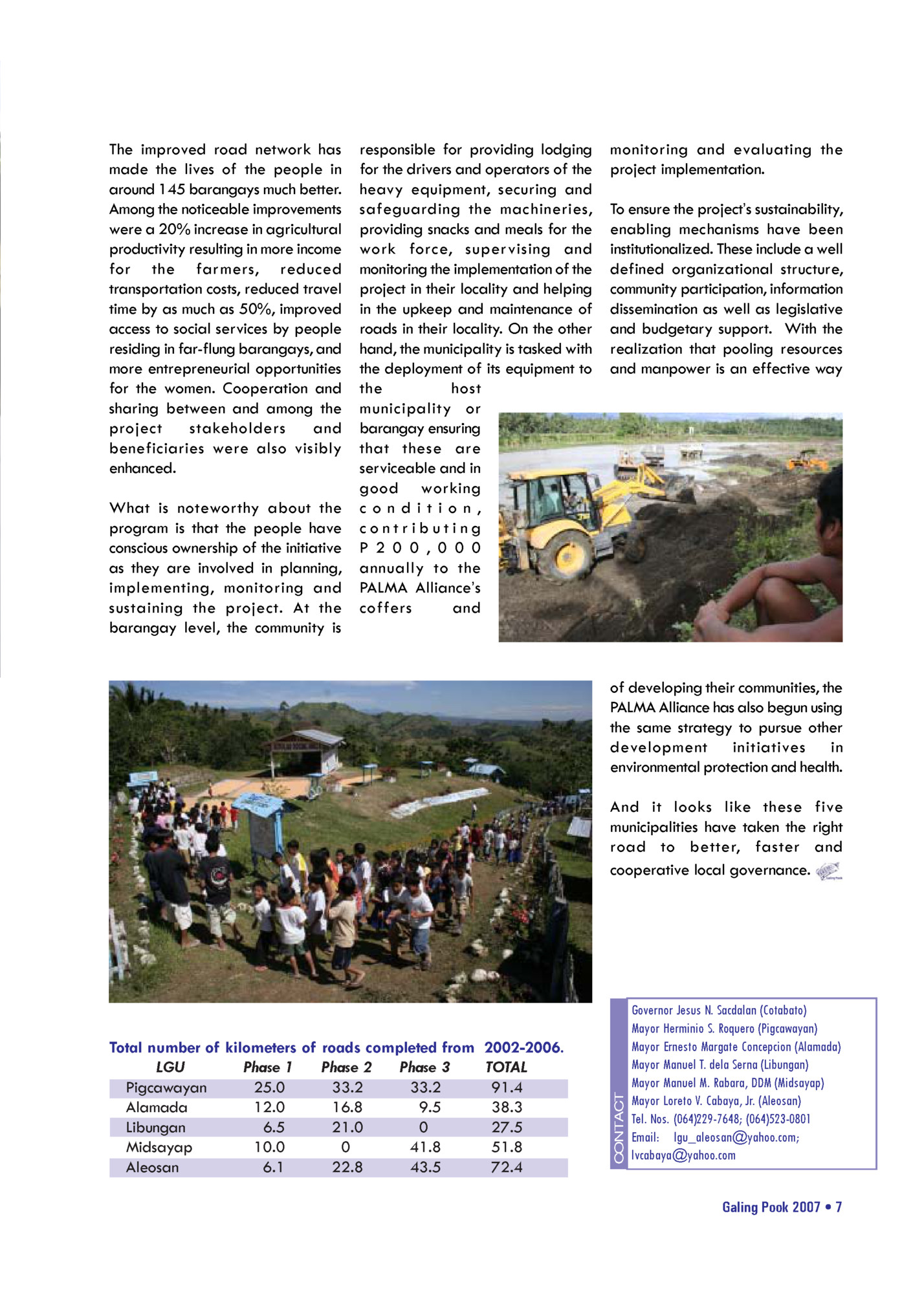
aste segregation is basic in ecological waste management. And what better way to educate people about waste segregation and reduction than by starting them young. In Marikina, the local government introduced a waste reduction program that involved sc hool c hildren. This has enabled the program to instill waste segregation and recycling practices at the household level. Through this program, a total of 238,000 kilograms of waste have been diverted from dumpsites, which could have contributed to air and land pollution. The monetary value of the recyclables has reached a total of P1.3 Million, which could have ended up in the dumpsite had they not been recovered. Introduced in June 2004 by Marikina’s Waste Management Office, in coordination with the Department of Education, the EcoSavers program required students to bring recyclable garbage from their respective households during an assigned Eco Day—the day when the garbage is going to be weighed and credited to their issued eco passbooks. Each of the 18 public elementary schools in the city is assigned an Eco Day, which is once a week. Accredited junk shops weigh the recyclables, record these in the passbooks and haul all the recyclables collected. The recyclables are then valued according to the prevailing market price and reflected in the individual passbooks using a point system (PhP1.00 = 1 point). Points earned entitle the eco-saver to shop in the Eco-Savers Mobile Store, which visits the school twice within the school 8 • Galing Pook 2007
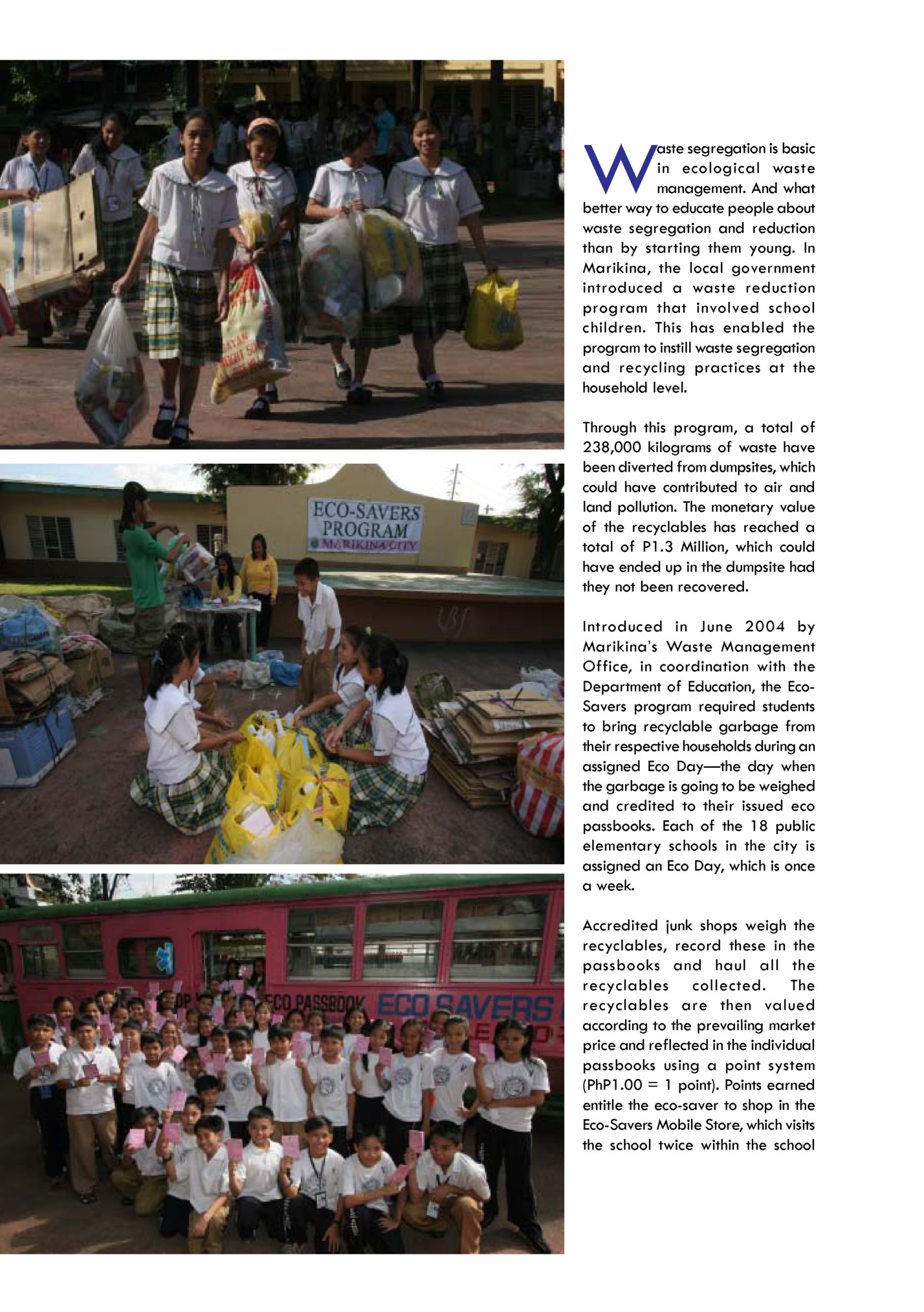
Eco Savers year. This mobile store carries educational materials suc h as dictionaries, books, school supplies and educational toys. An eco-saver only needs to present the passbook to purchase school supplies. There was no financial equity from the participants. They only have to bring recyclables from their households. This made it easier for the city government to elicit enthusiastic participation. But it is the positive impact of the initiative that has encouraged them to help sustain it. The program has been presented to the Metro Manila Spouses Association, which has been handling the clean and green program of the cities. It was also presented during the consultative conference between MMDA and the Solid Waste Managers of Metro Manila. It is also among the best practices listed in the Department of Environment and Natural Resources website. Between July 2004 to June 2005, there were 5,612 Lakbay Aral groups that visited Marikina to study the city’s Solid Waste Management Program. For sure, more people could benefit if the other local government units succeed in adopting the program. Waste by the Numbers Estimated waste generation per day: 230 tons or 690 cubic meters/day Percentage of biodegradable wastes: 45% Percentage of non-biodegradable wastes: 55% (about 80% recyclable) Cost of waste management: PhP1.00/kg. or about PhP230,000.00/day • • • • CONTACT Records show that individual savings or points earned, within a school year period, ranged from PhP50.00 to PhP1,800.00, which helped reduce household expenses on school supplies. The Eco-Savers program has also decreased the cost incurred in the disposal of local solid waste. The 50 truckload-trips a day to the dumpsite went down to an average of 30 trips a day and has also contributed to traffic decongestion, less air pollution, and energy conservation. Moreover, the program has provided junk shops within the city with a regular supply of recyclable materials. Mayor Ma. Lourdes C. Fernando Tel. Nos. (02)646-1634; (02)646-5277 Email: mcf@marikina.gov.ph Galing Pook 2007 • 9
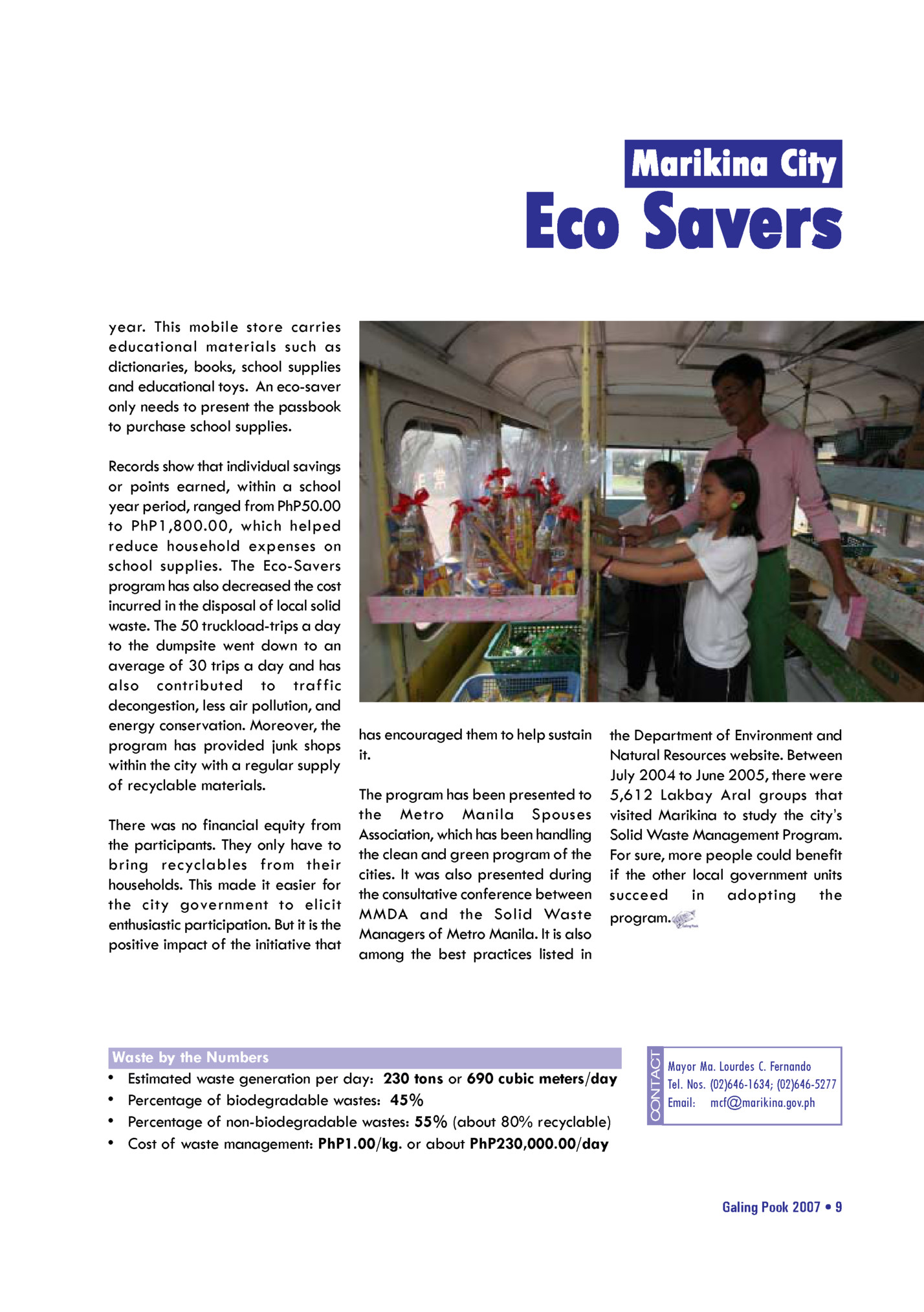
Fleepit Digital © 2021